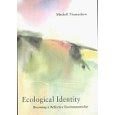

Conceive of a college campus as a food-producing, edible landscaping, demonstration-garden laboratory. Lawns are bisected by garden strips and framed with permaculture shrubbery. Rooftop gardens supply food for high-rise dormitories. Administration buildings have small greenhouses attached to their entrances. Cafeterias not only serve more local and organic food, but they have compelling exhibits that illustrate farm to garden food pathways, or calculate the energy costs of different methods of food production. The campus becomes a local and regional center for cooperative food growing efforts, a home for intergenerational, culturally diverse, bioregionally based experiments in food preparation and production.
Everybody has to eat and the curricular potential of learning about food unveils dozens of learning opportunities from lessons about biodiversity to practical, real world food-growing skills. Where does your food come from? How is it prepared? How much energy is used in its production? What foods are best suited for the ecology of our campus? What’s the cultivation and domestication history of the food we eat?
College administrations can lead the way by incorporating food production schemes into campus master plans, or by looking for inexpensive and innovative ways to initiate food landscaping opportunities, or by using more local and organic foods at college and community events.




